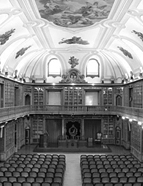

From its foundation in late 1779, history played a major role in the activities of the Lisbon Academy of Sciences (ACL), both as a specific branch of study and as an academic discipline worthy of an institutional framework. The initial ACL Statutes plan laid down the distribution of its members into three classes: Natural Sciences (also known as the sciences of observation and natural phenomena), Exact Sciences (or sciences of calculation) and Literature (or moral sciences and fine arts). The former two classes would later merge into the class of Sciences and the third would be referred to as the class of Literature, a division that still regulates the internal organisation of this institution today. When establishing the core subjects of the class of Literature, the premise that "the language spoken by a people and their past history are their most specific and unique features" was taken into consideration and "therefore the Portuguese Language and History, in all its possible facets and relations, are the two branches of study that constitute what the Academy assumed as Portuguese Literature" (Memórias de Literatura Portuguesa [Memoirs of Portuguese Literature], Part I, 1792, p. ii). By claiming this mission for itself, the ACL, to some extent, sought to ensure the continuity of the aims of the Academia Real da História Portuguesa [Royal Academy of Portuguese History], founded in 1720 under the aegis of King John V, whose activity gradually diminished from the mid-century onwards, to become disbanded in 1776. Thus, the ACL became the pivotal institution for the development of initiatives promoting knowledge of the Portuguese language and history, pursuing the efforts initiated by other intermittent and ephemeral literary and erudite academies throughout the first half of the 18th century. By making history a matter of its institutional competence, the ACL reconstructed a legacy it transformed into its own, assuming an entire intellectual heritage from which the names of Raphael Bluteau, António Caetano de Sousa and Diogo Barbosa Machado emerged.
One of the first and principal initiatives promoted by the ACL in the field of history was the registration and inventory of manuscript archival sources. This was accomplished by means of a systematic survey of the kingdom's registries and libraries, in search of unpublished documentation or documentation at risk of falling into oblivion. The contribution of Abbot José Correia da Serra, one of the ACL founders, in this mission was key to the scope and establishment of ACL guidelines for the registration and copying of relevant documents that were scattered across the kingdom's registries.
